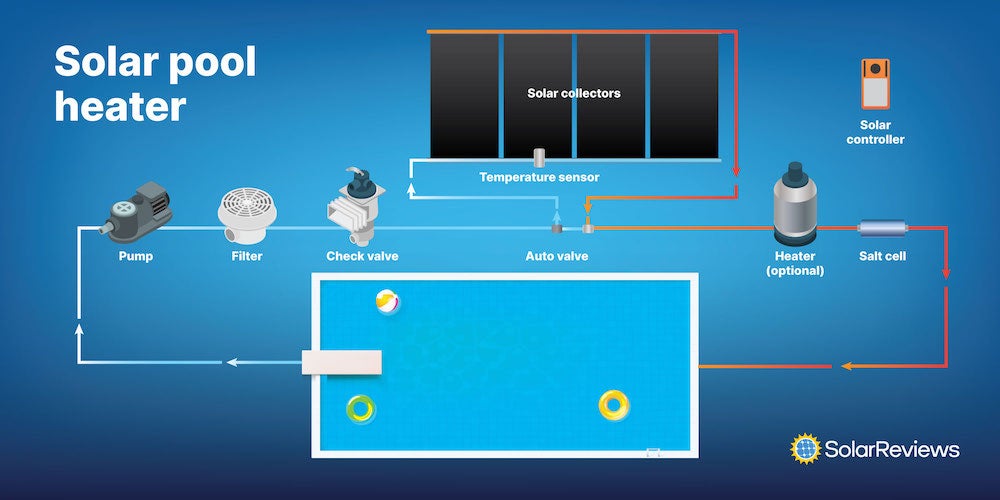Imagine lounging by your above-ground pool on a warm, sunny day, feeling the gentle breeze against your skin. The water is crystal clear, but you can’t help but wonder: do above-ground pools really need a heater? In this article, we’ll explore the benefits of adding a heater to your above-ground pool and how it can enhance your swimming experience, no matter the weather. Dive in and discover the possibilities!
This image is property of images.unsplash.com.
Benefits of Having a Heater for an Above-Ground Pool
Having a heater for your above-ground pool has several advantages that can enhance your swimming experience. Whether you enjoy a refreshing dip or want to extend your swimming season, a heater can provide the necessary comfort and control over water temperature.
Increased Comfort
One of the primary benefits of having a heater for your above-ground pool is the increased comfort it provides. With a heater, you can maintain the water at your desired temperature, ensuring that it is always warm and inviting. This means no more shivering when you first step into the pool and no more uncomfortable dips on cooler days.
Extended Swimming Season
Without a heater, the swimming season for above-ground pools is typically limited to the warmer months. However, with a heater, you can easily extend your swimming season. By maintaining the water temperature at a comfortable level, you can enjoy your pool earlier in the spring and later in the fall. This means more time to relax, exercise, and have fun in the water.
Better Water Temperature Control
Having a heater allows you to have precise control over the water temperature in your above-ground pool. This can be particularly beneficial if you have young children or elderly family members who may need the water to be warmer for safety or health reasons. Additionally, it also enables you to adjust the water temperature according to your preference, ensuring an enjoyable swimming experience for everyone.
Factors to Consider Before Installing a Heater
Before deciding on the type of heater for your above-ground pool, there are a few essential factors you should consider. These factors will help you determine the most suitable heater for your specific needs.
Location and Climate
The location of your pool and the climate of the area you live in play a significant role in choosing the right heater. If you reside in an area with consistently warm weather, you may not require a powerful heater. On the other hand, if you live in an area with fluctuating temperatures or colder climates, a heater with higher heating capacity may be necessary to maintain a comfortable water temperature.
Pool Usage
Consider how often and for what purposes you typically use your above-ground pool. If you only use your pool occasionally or for short periods, a less powerful and more cost-effective heater may be sufficient. However, if your pool sees frequent use or if you have large gatherings and parties, it may be wise to invest in a heater with a higher heating capacity to ensure rapid heating and maintenance of the desired water temperature.
Budget and Cost
Your budget is an important consideration when deciding on a heater for your above-ground pool. Different types of heaters have varying costs, both in terms of the initial purchase and ongoing energy consumption. It is crucial to evaluate your budget and choose a heater that not only suits your needs but also fits within your financial capabilities. Additionally, consider the long-term costs of operating the heater, including energy consumption and maintenance expenses.
Pool Size and Water Volume
The size of your above-ground pool and the volume of water it holds are determining factors when selecting a heater. Larger pools and higher water volumes require heaters with greater heating capacities to raise the temperature adequately and maintain it. Conversely, smaller pools with lower water volumes may not require as powerful a heater. Ensure to check the manufacturer’s guidelines and recommendations to choose a heater that is suitable for your specific pool size and water volume.
Types of Heaters for Above-Ground Pools
There are several types of heaters available for above-ground pools, each with its unique features and advantages. Understanding the different types will help you make an informed decision about which heater best meets your requirements.
Solar Heaters
Solar heaters utilize the sun’s energy to heat the water in your above-ground pool. They are designed with solar panels that capture the sun’s heat and transfer it to the pool water. Solar heaters offer a cost-effective and environmentally friendly heating solution.
Electric Heaters
Electric heaters utilize an electric heating element to warm the water in your above-ground pool. They are easy to install and provide fast heating results. Electric heaters are often preferred for their convenience and versatility.
Gas Heaters
Gas heaters utilize either propane or natural gas as a fuel source to heat the water in your above-ground pool. They are known for their ability to heat water quickly and efficiently. Gas heaters are suitable for pools of all sizes and can maintain a consistent water temperature regardless of environmental factors.
Heat Pumps
Heat pumps extract the outside air’s heat and transfer it to the water in your above-ground pool. They are highly energy-efficient and can significantly reduce energy costs. Heat pumps are an excellent choice for those looking for long-term savings and environmentally friendly heating options.
Solar Heaters
Solar heaters are a popular choice for above-ground pools due to their energy efficiency and cost-effectiveness. Understanding their principle of operation, pros and cons, as well as the cost and installation requirements, can help you make an informed decision.
Principle of Operation
Solar heaters utilize the heat from the sun to warm the water in your above-ground pool. They consist of solar panels or collectors that absorb solar radiation. This absorbed heat is then transferred to the pool water, raising its temperature.
Pros and Cons
One of the significant advantages of solar heaters is their energy efficiency. Since they use renewable solar energy, they have low operating costs once installed. Solar heaters are also environmentally friendly, producing zero emissions and reducing your carbon footprint. Additionally, they can extend your swimming season without significantly impacting your utility bills.
However, solar heaters do have some drawbacks. They are highly dependent on the availability of sunlight, so their performance may be affected by cloudy or overcast weather. Solar heaters also require a larger surface area for the installation of solar panels or collectors, which may be a limitation if you have limited space around your pool.
Cost and Installation
The cost of solar heaters can vary depending on factors such as the size of your pool, the number of solar panels required, and the specific brand and model. While the initial purchase cost may be higher compared to other types of heaters, solar heaters offer long-term energy savings.
Installation of solar heaters typically involves mounting the solar panels or collectors in a location where they receive maximum sunlight exposure. This can be on the roof of your house or a dedicated mounting structure adjacent to the pool. There may be additional costs associated with the installation, such as purchasing mounting hardware and plumbing connections, which should be factored into your budget.
This image is property of images.unsplash.com.
Electric Heaters
Electric heaters provide a reliable and convenient heating solution for above-ground pools. Understanding their principle of operation, pros and cons, as well as the cost and installation requirements can help you determine if they are suitable for your pool.
Principle of Operation
Electric heaters use an electric heating element to generate heat, which is then transferred to the water in your above-ground pool. The heating element is powered by electricity and quickly warms the water as it flows through the heater.
Pros and Cons
Electric heaters offer several advantages, making them a popular choice for above-ground pools. They are relatively easy to install, requiring minimal space and plumbing connections. Electric heaters also provide fast heat-up times, allowing you to enjoy your pool in a short amount of time. Additionally, electric heaters offer precise temperature control, allowing you to maintain the water temperature at your desired level.
However, electric heaters can be more expensive to operate compared to other types of heaters. The electricity consumption can lead to higher utility bills, especially if the heater is used frequently or for extended periods. Additionally, electric heaters may not be suitable for pools located in areas with high electricity costs.
Cost and Installation
The cost of electric heaters can vary depending on factors such as the heating capacity, brand, and model. While electric heaters may have a lower initial purchase cost compared to other types of heaters, it is important to consider the long-term operating costs associated with electricity consumption.
Installation of electric heaters is relatively straightforward. They are typically installed in-line with the pool’s plumbing system and require a dedicated electrical connection. It is recommended to hire a professional electrician to ensure proper installation and compliance with electrical safety standards.
Gas Heaters
Gas heaters provide a powerful and efficient heating solution for above-ground pools. Understanding their principle of operation, pros and cons, as well as the cost, installation, fuel availability, and ventilation requirements can help you determine if they are the right choice for your pool.
Principle of Operation
Gas heaters utilize either propane or natural gas as the fuel source to generate heat. The gas fuel is burned in a combustion chamber, which then transfers the heat to the water in your above-ground pool. Gas heaters can quickly raise the water temperature and maintain it at the desired level.
Pros and Cons
One of the significant advantages of gas heaters is their ability to heat the water in your above-ground pool quickly and efficiently. They are ideal for pools that require rapid heating or for those located in colder climates. Gas heaters also offer reliability and versatility, as they can maintain a consistent water temperature regardless of external factors.
However, gas heaters have a few considerations to keep in mind. One is the availability and cost of the fuel source, either propane or natural gas. Ensure you have access to a reliable and affordable fuel supply in your area. Gas heaters also require proper ventilation to ensure the safe exhaustion of combustion byproducts. This may involve installing additional vents or chimneys to meet ventilation requirements.
Cost and Installation
The cost of gas heaters can vary depending on factors such as the heating capacity, brand, and model. Gas heaters typically have a higher initial purchase cost compared to other types of heaters. Additionally, consider the ongoing cost of purchasing gas fuel, which can impact your overall expenses.
Installation of gas heaters should be done by a professional to ensure compliance with safety standards and proper connection to the gas supply. They require a dedicated gas line and electrical connection. Ensure to check local codes and regulations to ensure proper installation and operation.
Fuel Availability
When considering a gas heater for your above-ground pool, it is crucial to assess the availability and accessibility of the chosen fuel source. Propane and natural gas are the two most common fuel options for gas heaters. Propane is often delivered in tanks, while natural gas may require a connection to the existing gas line. Evaluate the local availability and cost of the chosen fuel to ensure it is a practical and affordable option for your pool.
Ventilation Requirements
Gas heaters produce combustion byproducts, including carbon monoxide, which must be safely exhausted to prevent health hazards. Proper ventilation is required to remove these byproducts from the pool area. If your pool is located in an enclosed space, such as a pool house or garage, additional ventilation considerations may be necessary. Consult with a professional to assess the ventilation requirements and ensure compliance with safety regulations.
This image is property of images.unsplash.com.
Heat Pumps
Heat pumps offer a highly energy-efficient and environmentally friendly heating solution for above-ground pools. Understanding their principle of operation, pros and cons, as well as the cost and installation requirements, can help you determine if they are suitable for your pool.
Principle of Operation
Heat pumps extract heat from the surrounding air and transfer it to the water in your above-ground pool. They utilize a refrigeration cycle that compresses and expands a refrigerant, absorbing and releasing heat in the process. Heat pumps are designed to work efficiently even in cooler climates.
Pros and Cons
Heat pumps offer several advantages that make them an attractive choice for above-ground pool owners. They are highly energy-efficient, providing significant savings in operating costs compared to other types of heaters. Heat pumps also have a long lifespan and require minimal maintenance. Additionally, they are environmentally friendly, producing fewer emissions and reducing your carbon footprint.
However, heat pumps may have limited effectiveness in extremely cold climates. As they rely on extracting heat from the surrounding air, colder temperatures can impact their efficiency. Additionally, heat pumps typically have a higher initial purchase cost compared to other types of heaters. It is important to consider these factors when deciding if a heat pump is suitable for your pool.
Cost and Installation
The cost of heat pumps can vary depending on factors such as the heating capacity, brand, and model. Heat pumps may have a higher initial purchase cost compared to other types of heaters. However, their energy efficiency can lead to significant long-term savings in operating costs.
Installation of heat pumps should be done by a professional to ensure proper connection to the pool’s plumbing system and electrical supply. Heat pumps require a dedicated electrical connection and may require additional plumbing connections. Consider the specific installation requirements of the chosen heat pump and consult with a professional to ensure a proper and efficient installation.
Energy Efficiency
One of the significant advantages of heat pumps is their high energy efficiency. They can effectively transfer heat from the surrounding air to the pool water with minimal energy consumption. Heat pumps operate by utilizing electricity to power the refrigeration cycle, making them an environmentally friendly option. They can significantly reduce energy costs compared to other types of heaters, offering long-term savings.
Important Considerations for Heater Installation
Installing a heater for your above-ground pool requires careful consideration of important factors to ensure its effectiveness, safety, and compatibility with your pool equipment. Keep the following considerations in mind before proceeding with the installation.
Professional Installation
It is highly recommended to hire a professional for the installation of your pool heater. They have the necessary expertise and knowledge to ensure proper installation, compliance with safety standards, and optimal performance. DIY installation may lead to complications, potential safety hazards, or ineffective heating.
Safety Precautions
Pool heaters require proper safety precautions to ensure the well-being of those using the pool. Consider installing safety features such as protective covers, temperature controls, and safety shut-off switches. Adhere to all safety guidelines provided by the manufacturer and consult with a professional to ensure compliance with local codes and regulations.
Maintenance Requirements
Regular maintenance is essential to ensure the longevity and efficient operation of your pool heater. Follow the manufacturer’s guidelines regarding maintenance tasks such as cleaning, inspecting, and servicing the heater. Ensure proper storage and winterization if you live in an area with freezing temperatures.
Compatibility with Pool Equipment
Ensure that the heater you choose is compatible with your existing pool equipment, such as pumps, filters, and plumbing connections. Consider consulting with a professional and providing them with the specifications of your pool equipment to ensure compatibility and optimal performance.
Warranty and Customer Support
When purchasing a pool heater, consider the warranty offered by the manufacturer. A comprehensive warranty can provide peace of mind in case of any potential issues or defects. Additionally, assess the customer support provided by the manufacturer in case you require assistance or have any questions regarding the installation or operation of the heater.
Alternative Heating Methods for Above-Ground Pools
In addition to heaters, there are alternative methods to heat your above-ground pool. These methods can provide varying degrees of heating and are worth considering based on your specific needs and budget.
Solar Blankets
Solar blankets, also known as pool covers, can help retain heat in your above-ground pool. They are made of a durable and insulating material that traps heat from sunlight and prevents heat loss through evaporation. Solar blankets are a cost-effective way to increase the water temperature and reduce energy consumption.
Pool Covers
Pool covers offer a similar benefit to solar blankets by reducing heat loss through evaporation. They are typically made of vinyl or other durable materials and can be installed manually or automatically. Pool covers not only help to retain heat but also keep debris and leaves out of the pool, reducing the maintenance required.
Pool Enclosures
Pool enclosures provide additional insulation and protection against external elements. They are typically constructed of glass or polycarbonate panels that enclose the pool, creating a greenhouse effect. Pool enclosures retain heat and block wind, keeping the water temperature comfortable and reducing the need for additional heating.
Conclusion
Assessing your above-ground pool’s heating needs is crucial to provide optimal comfort and enjoyment. By considering factors such as location, climate, pool usage, budget, and pool size, you can determine the most suitable heater for your pool. Solar heaters, electric heaters, gas heaters, and heat pumps each offer unique advantages and considerations. Remember to prioritize professional installation, safety precautions, maintenance, compatibility with pool equipment, and warranty when choosing a heater. Additionally, alternative heating methods such as solar blankets, pool covers, and pool enclosures can enhance the overall heating efficiency of your above-ground pool. By making an informed decision based on your specific needs and budget, you can ensure a pleasant and comfortable swimming experience throughout the year.







